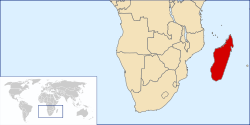| Neomixis | |
|---|---|
 | |
| Common jery (Neomixis tenella) | |
| Scientific classification | |
| Kingdom: | Animalia |
| Phylum: | Chordata |
| Class: | Aves |
| Order: | Passeriformes |
| Family: | Cisticolidae |
| Genus: | Neomixis Sharpe, 1881 |
| Type species | |
| Neomixis striatigula [1] Sharpe, 1881 | |
 | |
| Native range of Neomixis striatigula | |
Neomixis is a genus of small forest birds that are endemic to Madagascar.
The genus was introduced by the English zoologist Richard Bowdler Sharpe in 1881. The type species is the stripe-throated jery (Neomixis striatigula). [2] The genus was formerly placed in the Old World babbler family but is now considered to belong to the family Cisticolidae.


